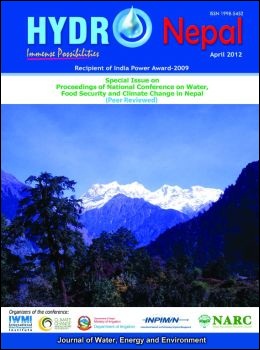Testing Farmers’ Perception of Climate Variability: A Case Study from Kirtipur of Kathmandu Valley
DOI:
https://doi.org/10.3126/hn.v11i1.7200Keywords:
Farmer’s perception, weather, climate change, experience, NepalAbstract
In the 21st century, global climate change has become a public and political discourse. However, there is still a wide gap between global and local perspectives. The global perspective focuses on climate fluctuations that affect the larger region; and their analysis is based on long-term records over centuries and millennium. By comparison, local peoples’ perspectives vary locally, and local analyses are limited to a few days, years, decades and generations only. This paper examines how farmers in Kirtipur of Kathmandu Valley, Nepal, understand climate variability in their surroundings. The researcher has used a cognized model to understand farmers’ perception on weather fluctuations and climate change. The researcher has documented several eyewitness accounts of farmers about weather fluctuations which they have been observing in a lifetime. The researcher has also used rainfall data from 1970-2009 to test the accuracy of perceptions. Unlike meteorological analyses, farmers recall and their understanding of climatic variability by weather-crop interaction, and events associating with climatic fluctuations and perceptions are shaped by both physical visibility and cultural frame or belief system.
DOI: http://dx.doi.org/10.3126/hn.v11i1.7200
Hydro Nepal Special Issue: Conference Proceedings 2012 pp.30-34
Downloads
Downloads
Published
How to Cite
Issue
Section
License
The copyright of the articles and papers published is held by HYDRO Nepal Journal.
The views and interpretation in this journal are those of author(s), and HYDRO Nepal does not bear any responsibility for the views expressed by authors in the journal.




